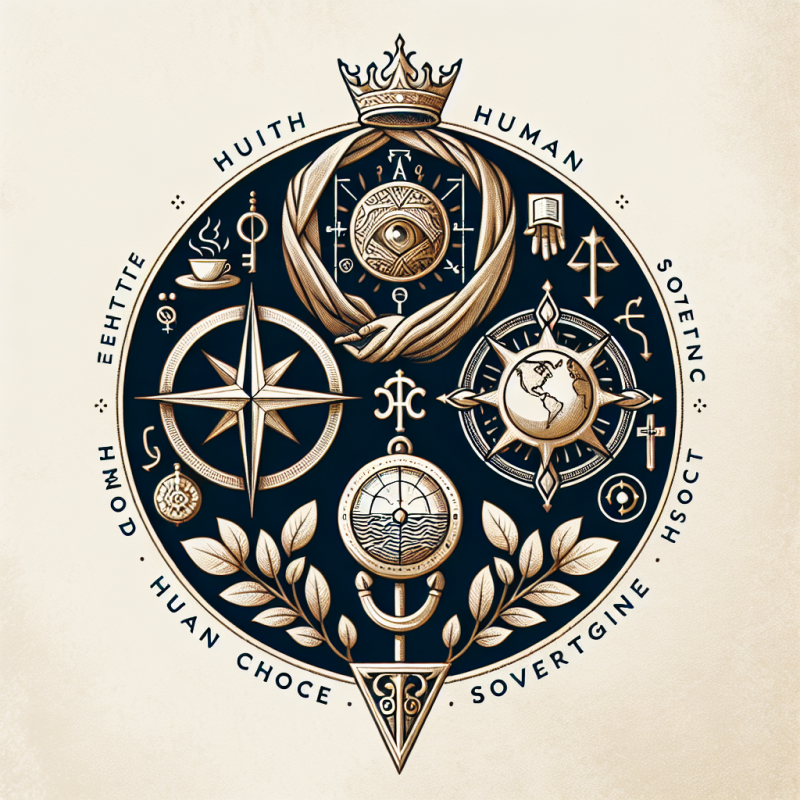“`html
Personal Identity, Resurrection, and the Christian Perspective
As I reflect on the deep questions of human identity and resurrection, I find that these topics resonate with my own journey of faith—a journey shaped by doubt, discovery, and transformation. The concepts of who we are, what makes us unique, and how we continue beyond this physical life are not only philosophical or theological musings but also deeply personal inquiries. Considering these questions from a Christian lens has provided me with profound insights, as well as an abiding sense of hope.
Personal identity is a cornerstone of how we perceive ourselves and others. From a Christian theistic perspective, our identity is intimately tied to God’s creation and the promise of resurrection. Unlike secular philosophies that often struggle to provide satisfactory answers to what constitutes continuity between a baby and the person they grow into—or what keeps “me” the same person as I was last year—Christianity offers a powerful framework that transcends mere physicality.
The Christian Understanding of Personal Identity
For many Christians, personal identity is rooted in the belief in an immortal soul. This soul, granted by God and sustained by His grace, ensures that our essence—who we are at our core—remains constant from conception, through life, and into eternity. This perspective provides an answer to the secular philosophical challenge: How can we remain the same when the cells in our bodies are constantly replaced, and our neurons and synapses evolve with time? The answer lies not in the material but in the spiritual and relational dimensions of identity.
In the words of philosopher John Locke, identity is often discussed in terms of memories and conscious experiences. However, Christianity expands this view: our identity is not simply a matter of continuity or consciousness but of our relationship to God. It is our moral character, shaped by our walk with Christ, that defines us most profoundly.
The Challenge of Individualism
In Western culture, especially in America, individualism plays a significant role in shaping how we view identity. This focus on the “self” often leads us to think of our identity as independent of others. However, from a Christian perspective, this view is incomplete. Our identity is deeply relational. We are shaped by our relationships with others and, most importantly, by our relationship with God. It is within our community of faith—our family, our church, our friends—that the fullness of who we are finds its true expression.
Resurrection and the Transformation of Identity
The concept of resurrection is integral to Christian theology. It promises not just continuity of identity but its transformation into something more glorious and eternal. The Apostle Paul writes in 1 Corinthians 15:42-44:
“So will it be with the resurrection of the dead. The body that is sown is perishable, it is raised imperishable; it is sown in dishonor, it is raised in glory; it is sown in weakness, it is raised in power; it is sown a natural body, it is raised a spiritual body.”
In this new reality, our identity will no longer be dependent on the physical molecules and neurons that comprise our current bodies. Instead, it will be rooted in a “spiritual body,” one that allows for the social interactions and relationships that make us human, while simultaneously being free from decay and death. Resurrection is not simply about the reconstitution of our physical selves but the preservation and elevation of our moral character and essence.
< >
>
Character as the Core of Identity
One of the most striking realizations in contemplating resurrection is the centrality of moral character. As a Christian, I have come to believe that our journey in this life—the triumphs, failures, and lessons—is about shaping our moral character to reflect Christ. This is not simply for personal growth but to prepare us for eternal fellowship in the Kingdom of God. In the resurrection, it is this Christ-like character that will endure and flourish.
As Augustine once suggested, our resurrected selves may be at the “peak of development,” free from the limitations of aging and decay, but retaining the essence of who we are. Our identity, molded by our earthly experiences and our relationship with God, will carry into eternity.
< >
>
Relationships and Identity in Eternity
Another profound aspect of Christian teaching is how relationships shape and define us. In the next life, relationships do not dissolve; they are redeemed and perfected. We are promised a future where we are reunited with loved ones, fellow believers, and most importantly, with God—our ultimate source of identity. Jesus himself spoke of the joy of table fellowship in the Kingdom of God (Matthew 8:11), a vision of relational completeness and communal joy.
<
>
Unanswered Mysteries
While the Bible provides guiding principles about identity and resurrection, it does not answer all the “how” questions. What is the mechanism by which God preserves our identity? How does resurrection work at a metaphysical level? These are eschatological questions, and as finite beings, we cannot fully comprehend the infinite wisdom of God. This humility in the face of mystery is an important aspect of faith. As Isaiah 55:8-9 reminds us:
“For my thoughts are not your thoughts, neither are your ways my ways,” declares the Lord. “As the heavens are higher than the earth, so are my ways higher than your ways and my thoughts than your thoughts.”
The Hope of Resurrection
Even amidst unanswered questions, the hope of resurrection offers profound comfort. It assures us that death is not the end and that God, in His infinite love and power, preserves and redeems all that is good and true about us. This hope calls us to live with purpose, striving to develop a character worthy of that eternal life, shaped by the moral example of Christ.
< >
>
Looking Back and Moving Forward
This exploration ties deeply into themes from previous posts, such as Why This Isn’t the Best Possible World and What It Reveals About God’s Purpose, where we discussed the imperfections of this life and the redemptive purpose behind suffering. While this world is not perfect, it forms the crucible in which our character is refined for eternity.
Likewise, the theme of identity echoes in articles like How Science and Theology Can Work Together, where we explored how faith bridges gaps that science cannot fully explain. Similarly, understanding our identity through the lens of resurrection adds spiritual depth to philosophical inquiries, offering answers that satisfy both heart and mind.
Conclusion
As we ponder the mysteries of identity and resurrection, we must hold fast to the truths revealed in Scripture and the promise of eternal life with God. While we may not have all the answers, we are called to trust in His wisdom, prepare our hearts, and live a life that reflects His love and grace. In the end, it is our relationship with God and our Christ-like character that will transcend this fragile, fleeting existence and carry us into the transformative promise of resurrection.
Focus Keyphrase: Personal identity and resurrection
“`




This was a helpful read. Looking forward to more content like this!
Thank you for reading! I wrote this article to share my thoughts and insights. I’d love to hear your feedback and discuss further in the comments!